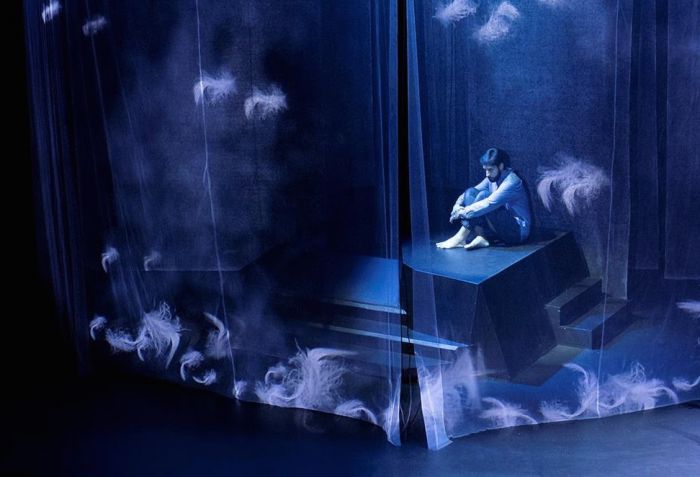Butler directed her anger at Abbott’s absurd appeal to Jesus, whose teaching is based on compassion, and his use of religion to evade personal responsibility for an inhumane policy, into intense research into the experiences of asylum seekers. From their collective history she created the character, Hamed Mokri (Reza Momenzada), and the play emerged from Mokri’s struggle to escape violent civil conflict and find a place that offered an opportunity to build a safe future for his family.
Many of the situations Mokri faces – the checkpoint, the rickety plane, the crowded boat, a storm at sea – are by now familiar to us. Nevertheless, as a monologue the terrors of Mokri’s journey, so creatively staged, and performed with a driven intensity by Momenzada, would have been deeply moving. An added poignancy is achieved through the intervention of an Angel of Death (Gabrielle Scawthorn), who has been ordered by “The Host”, an abstract entity, to eliminate Mokri before he reaches his destination.
She begins committed to her task, and indifferent to Mokri’s grief for his wife and son, killed in an explosion, and to his loving protection of his surviving daughter.
However, despite the Angel’s fear of losing her wings, the punishment demanded by The Host for disobedience, she waivers. Mokri’s all-consuming desire to save his child, to shelter her even beyond death, overcomes her “training”, and she cannot summon the will to obliterate him. The point is well made that most of us, if we were asked to take another’s life, could not carry out such an act, but we do, and can, hide behind inhumane policies that achieve the same end.
While we understand why the desperate Mokri – a personal tragedy – and the exterminating Angel – impersonal forces – do not interact at any point, the device of having both characters speak simultaneously is a perplexing choice. In addition, it feels as if the Angel has too much to say and what is said is too consciously poetical, diffusing rather than concentrating dramatic energy for much of this short play.
The set is a miracle of minimalist achievement and congratulations to the creative crew. Sheer curtains enclose Mokri in a nightmare world as they are lit by a violent explosion, simulate the horror of a massive wave or evoke the ocean’s depths. They can suggest a flock of exterminating angels hovering over the small boat or as white feathers drop one by one, the Angel’s painful sacrifice of flight.
Director Suzanne Pereira has been faithful to Butler’s vision of a world motivated by the loving heart rather than dictated to by economic policy. Her aim is to send the audience out “with questions, not answers”, and in this, Pereira, her cast, and crew, have been successful.





